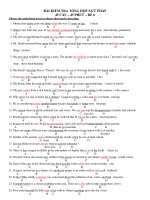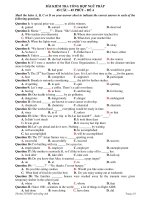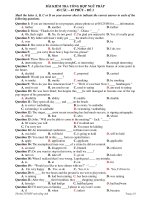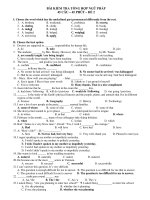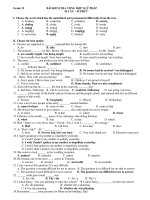Tổng hợp ngữ pháp và bảng bất động từ quy tắc 8
Bạn đang xem bản rút gọn của tài liệu. Xem và tải ngay bản đầy đủ của tài liệu tại đây (168.06 KB, 14 trang )
TỔNG HỢP NGỮ PHÁP VÀ BẢNG ĐỘNG TỪ BẤT QUY TẮC LỚP 8
-TIẾNG ANHI . TOO / ENOUGH : Quá … không thể …
*S + Be + TOO + ADJ + ( for +O ) + To + V .
* S+ V + TOO +ADV + ( for+ O ) + To + V .
*S+ Be +( NOT ) + ENOUGH + ADJ+ ( for + O ) + To + V . Đủ … để
*S+ V + (NOT ) + ENOUGH+ ADV + ( for + O ) + To +V.
II. So ……That /Such …….That : Quá ……….đến nỗi mà …….
*SO + ADJ / ADV + That + Clause .
*SUCH + ( a , an ) + ADJ + N + That Clause .
III. REFLECTIVE PRONOUNS : Đại từ phản thân
I -> Myself
We -> Ourselves
You -> Yourself / yourselves
They -> Themselves
She -> Herself
He -> Himself
It -> Itself
IV . MODAL VERBS : Động từ kiếm khuyết
S + MODAL VERBS ( not ) + Vinf without “To ”
Can
Could
Should
May
Might
Must
Ought to : nên
Had better: nên
Would
V. USED TO / BE USED TO
1.S + USED TO + V : Đã từng làm gì trong quá khứ
2. S + BE USED TO + VING / N : Quen ( trở nên quen ) làm gì đó
VI . DEMANDs : CÂU RA LỆNH
* V + ( Please ) .
* DON’T + V + ( Please )
VII . REPORTED SPEECH : Câu tường thuật
1.Polite requests
– “ CAN / COULD / WOULD / WILL + YOU + ( Please ) + Vinf ……? ”
– “ V + Please ”.
– “ DON’T + V + Please ”
->Reported speech :
S + ASKED + O + ( not ) + to + V.
TOLD
REQUESTED
2. Advice :Lời khuyên
“ S + should / ought to / had better (not ) ………..”
->REPORTED SPEECH
– S + Advised + O + (not ) to V.
– S + Said ( to O ) That S (o ) should / ought to / had better….
VII. So as / In order for purpose :Chỉ mục đích
So as ( not ) to V = In order ( not ) to V : Để ( không )
VIII . GERUNDS . Danh động từ
S + V + GERUND(Ving).
Love
Like ( Dislike )
Enjoy
Hate
Prefer
Start( Begin)
Stop / Finish
Practice
Remember : nhớ đã làm gì trong qkhứ
Try : thử # Try + to V : cố gắng
Mind : phiền lòng
IX . Passive voice: Câu bị động
•
Present simple
Active
Passive
+ S + Vs ,es + O
Wh+S(o)+is/am/are( not)+VpII
S + Vzero + O
– S + do / does not + Vinf + O .
? Wh + do /does + S + Vinf + O
•
Present Continuous
Wh + S + is (not )+ Ving + O-> Wh + S(o) + is + being + VpII
am
are
•
Present perfect
Wh + S + have + VpII -> Wh + S(o) + have + been VpII
has
•
Past Simple
Active
Passive
+ S + VED + O .
Wh +S(O) + was (not)+ VpII
– S + didn’t + V inf + O .
were
? ( Wh) + Did + S + Vinf + O ?
•
Near future.
Wh + S + is + going +to V + O
Wh + S(o) is + going +tobe+VpII
am
am
are
are
•
Modal Verbs Động từ khiếm khuyết
S + MODAL VERBS ( not ) +be + VPII
Can
Could
Should
May
Might
Must
Ought to : nên
Had better: nên
Would
Will
Shall
X . Present Perfect. Thì hiện tại hồn thành
1. Use: + to express an unfinished action ( một hành động dang dở )
+to express an experience. ( một kinh nghiệm )
+ to express an action which has just happened in the past but the time is
not important.
* Dấu hiệu nhận biết: since, for, not….yet, ….yet? , lately = recently( gần đây
) , so far = since then = up to now ( từ đó đến nay ), just( vừa mới ) , already(
rồi) , never , ever , it is the first ( second …) time
XI . Do / Would you mind…………….?
+ Do you mind + Ving ……? -> a polite request.
Would you mind + Ving ….?
+ Do you mind if I + Vzero ………? -> a polite permission
Would you mind if + I + Ved ……?
= May / Can I + Vinf ………?
XII. Present participle/past participle
1. Present participle ( Ving )
It is used as an Adj to modify a N ( active )
Ex . The tiger killing the hunter is very big
2. Past participle ( VpII )
It is used as an Adj to modify a N ( passive )
Ex. The tiger killed by the hunter is very big .
XIII. Present Conti…with always Hiện tại tiếp diễn với always
•
It is used to express a complaint .
Ex . He is always talking in the class !
You are always making noisy when I sleep well!
XIV. How to pronounce the ending “ed” and “s” & “es” Phát âm –ed và -s
1. “ed”
•
/ id / : Tận cùng là các âm : / t / & / d /
•
/ t / : Tận cùng là các âm : / s / , / f / , / p / , / k / , / tS / , / S /
Ex : laughed , washed , watched , danced
•
/ d / : Trường hợp còn lại .
Ex : raised , used , studied ………..
2. “s” & “es ”
•
/ iz / : Tận cùng là các âm : / s / ; /S/ ; / z / ; / tS / ; / dz/
Ex : buses ; houses ; places ; couches ; oranges ; boxes……
•
/ s / : Tận cùng là các âm : / p / ; / k / / t / ; / f /
•
/ z / : Trường hợp còn lại.
XV : Reported speech . Câu tường thuật
1 . Direct : Present simple -> Indirect : Past simple
+ S + Ves, s / Vzero. -> S said S + Ved …….
– S + don’t / doesn’t + Vinf.-> S said/ told (to O that) S didn’t Vinf
Do / Does + S + Vinf …? -> S asked + O if / whether S +Ved……
Wh + do/does + S + Vinf ..? -> S asked + O Wh + S + Ved ……….
2 . Direct : Past simple -> Indirect : Past simple
+ S + Ved . -> S said S + Ved …….
– S + didn’t + Vinf.-> S said/ told (to O that) S didn’t Vinf
Did + S + Vinf …? -> S asked + O if / whether S +Ved.
Wh + did + S + Vinf ..? -> S asked + O Wh + S + Ved .
3. Present Continuous…. -> Past Continuous
S + is (not )+ Ving + O -> S said S + was ( not )+ Ving .
am
were
are
is / am / are + S + Ving ? -> S asked +O if /whether S + was/were + Ving .
Wh + is / am/are +S + Ving ? -> S + asked O Wh + S + was / were + Ving.
4. Present perfect -> Past Perfect
S + have (not ) + VpII . -> S said + S+ had+ VpII.
has
Have / has + S + VpII ? -> S asked O if/ whether S + had + VpII.
Wh + have / has + S + VpII ? S asked Wh + S + had + VpII .
5. Will / Shall -> Would
6. Can -> Could
7. Must -> Had to
8. Is / am / are going to -> was / were going to
9.May -> Might
100 Động từ bất quy tắc trong tiếng Anh lớp 8
TT
Infinitive
Past
PastParticiple
Meaning
1
2
3
4
5
6
7
8
9
10
be (am,is,are)
become
begin
blow
break
bring
build
burst
buy
can
was, were
Became
Began
Blew
Broke
Brought
Built
Burst
Bought
Could
been
become
begun
blown
broken
brought
built
burst
bought
thì, là, ở
trở nên
bắt đầu
thổi
bể, làm vỡ
mang
xây dựng
nổ, nổ tung
mua
có thể
TT
Infinitive
Past
PastParticiple
Meaning
11
12
13
14
15
16
17
18
19
20
21
22
23
24
25
26
27
28
29
30
31
32
33
34
35
36
37
38
39
40
41
42
43
catch
choose
come
cost
cut
do
draw
drink
drive
eat
fall
feed
feel
fight
find
fly
forget
forgive
freeze
get
give
go
grow
hang
have
hear
hide
hit
hold
hurt
keep
know
lay
Caught
Chose
came
cost
cut
did
drew
drank
drove
ate
fell
fed
felt
fought
found
flew
forgot
forgave
froze
got
gave
went
grew
hung
had
heard
hid
hit
held
hurt
kept
knew
laid
caught
chosen
come
cost
cut
done
drawn
drunk
driven
eaten
fallen
fed
felt
fought
found
flown
forgotten
forgiven
frozen
gotten
given
gone
grown
hang
had
heard
hidden
hit
held
hurt
kept
known
laid
chụp, bắt
lựa chọn
đến
trị giá
cắt
làm
vẽ
uống
lái xe
ăn
rơi, té, ngã
cho ăn, nuôi
cảm thấy
chiến đấu
tìm thấy
bay
qn
tha thứ
đơng lại, ướp
có được, trở nên
cho, biếu, tặng
đi
mọc, lớn lên
treo
có
nghe, nghe thấy
che dấu, ẩn nấp
đánh, đụng, va
cầm, tổ chức
làm đau, đau
giữ, giữ gìn
biết
đặt, đẻ (trứng)
TT
Infinitive
Past
PastParticiple
Meaning
44
lead
led
led
dẫn dắt, lãnh đạo
45
46
47
48
49
50
51
52
53
54
55
56
57
58
59
60
61
62
63
64
65
66
67
68
69
70
71
72
73
74
75
76
lean
learn
leave
lend
let
lie
light
lose
make
may
meet
must
pay
put
read
ride
ring
rise
run
Say
See
Sell
send
Set
shake
shall
shine
shoot
show
Shut
Sing
Sink
leant
learnt
left
lent
let
laid
lighted
lost
made
might
met
had to
paid
put
read
rode
rang
rose
ran
said
saw
sold
sent
set
shook
should
shone
shot
showed
shut
sang
sank
leant
learnt
left
lent
let
lain
lit
lost
made
nghiêng, dựa vào
học
rời đi, để lại
cho mượn
để cho
nằm
thắp sáng
đánh mất, lạc
làm, chế tạo
được phép, có lẽ
gặp
phải
trả tiền
đặt, để
đọc
cưỡi, đi (xe)
rung, reo
dâng lên
chạy
nói
nhìn thấy, thấy
bán
gởi
đặt, để
rung, lắc
sẽ, nên
chiếu sáng
bắn, sút (bóng)
chỉ, cho xem
đóng lại
hát
chìm xuống
met
paid
put
read
ridden
rung
risen
run
said
seen
sold
sent
set
shaken
shone
shot
shown
shut
sung
sunk
TT
Infinitive
Past
PastParticiple
Meaning
77
78
79
80
81
82
83
84
85
86
87
88
89
90
91
92
93
94
95
96
97
98
99
100
Sit
sleep
smell
speak
spend
split
spread
stand
steal
strike
sweep
swim
take
teach
tear
tell
think
throw
understand
wake
wear
will
win
write
sat
slept
smelt
spoke
spent
split
spread
stood
stole
stroke
swept
swam
took
taught
tore
told
thought
threw
understood
woke
wore
would
won
wrote
sat
slept
smelt
spoken
spent
split
spread
stood
stolen
stricken
swept
swum
taken
taught
torn
told
thought
thrown
understood
waken
worn
ngồi
ngủ
ngửi
nói
tiêu, xài, trải qua
chẻ, nứt
trải ra, lan đi
đúng
đánh cắp
đánh, đình cơng
qt
bơi
cầm lấy
dạy
xé rách
kể lại, nói
nghĩ, suy nghĩ
ném, quăng
hiểu
thức dậy
mặc, mang, đội
sẽ
thắng cuộc
viết
won
written
Bài tập động từ bất quy tắc lớp 8
Bài 1: Chia động từ trong ngoặc theo quá khứ đơn
a. The film ………………… (begin) late.
b. I ………………… (choose) noodle for lunch.
c. He ………………… (keep) his promise.
d. The children ………………… (sleep) on the sofa.
đ. We ………………… (lend) Lisa $50.
e. He ………………… (tell) us that he lived in Shanghai.
ê. At the age of 25, he ………………… (become) a designer.
g.They ………………… (swim) 650 meters.
h. I ………………… (give) my friend a CD for Christmas.
i. They ………………… (speak) Japanese to the waiter.
ĐÁP ÁN
a. began
b. chose
c. kept
d. slept
đ. lent
e. told
ê. became
g. swimed
h. gave
i. spoke
Bài 2: Chia động từ trong ngoặc theo quá khứ phân từ
1. Why has she ………………… (leave) already?
2. Had you ………………… (hear) of this band before you came here?
3. I’ve ………………… (give) some money to Anne.
4. She’s ………………… (bring) a cake to the party, we ate it all.
5. It had ………………… (become) very cold, so we went inside.
6. Don’t worry, we haven’t ………………… (forget) about the party.
7. The birds have ………………… (fly) south for the winter.
8. I have ………………… (be) sick all day.
9. They have ………………… (begin) painting the living room.
10. I have ………………… (keep) this secret for ages.
ĐÁP ÁN
1. left
2. heard
3. given
4. brought
5. become
6. forgotten
7. flown
8. had
9. begun
10. kept
Bài 3: Change verb into the past simple
1.I (read) _____ three books last week
2. They (speak) _______ French to the waitress.
3. He (understand) _______ during the class, but now he doesn't understand.
4. He (forget) ______ to buy some milk.
5. I (give) ______ my mother a CD for Christmas.
6. He (tell) _____ me that he lived in Toronto.
7. The film (begin) ______ late.
8. We (fly) ______ to Da Nang.
9. They (drive) _____ to Beijing.
10. He (teach) ______ English at the University.
Bài 4: Change verbs into past participle
1. We've already (have) ____lunch.
2. This was the first time she had (do) _____ her homework.
3. He has never (drive) _______ a motorbike before.
4. By the time we arrived, the children had (eat) ______ all the chocolate.
5. Are you okay? I've (feel) ______ better.
6. I'd (lend) _____ my umbrella to John, so I got wet.
7. It had (become) ______ very cold, so we went inside.
8. Have you (choose) ______ your university yet?
9. Why has John (leave) _____ already?
10. She has (know) ______ about this problem for three months.
Bài 5. Change verbs into the correct form
1. Have you already (read) ______ today's newspaper?
2. He has (lose) _____ his wallet again.
3. They (speak) ______ French to the waitress.
4. They (swim) _____ 500m.
5. I have (write) _______ three essays this week.
6. She (drink) _____ too much coffee yesterday.
7. The children (sleep) ______ in the car.
8. I (send) ______ you an email earlier.
9. She had (wear) _____ her blue dress many times.
10. Why have you (stand) ______ up - are we leaving?



